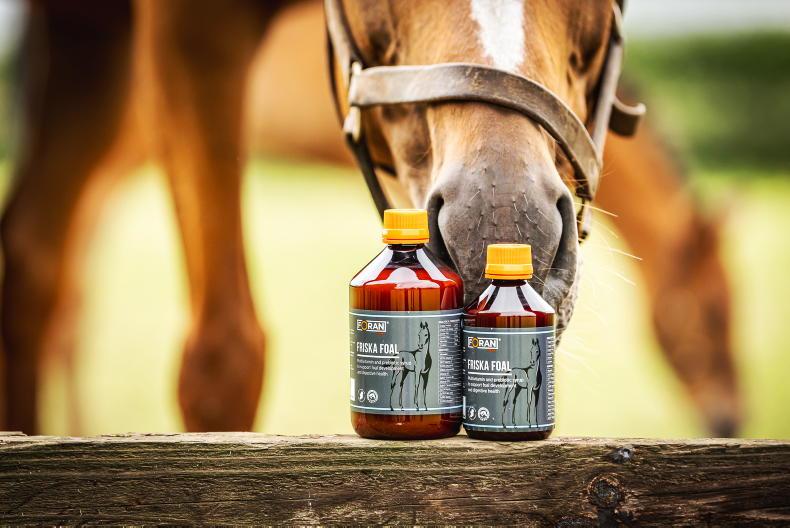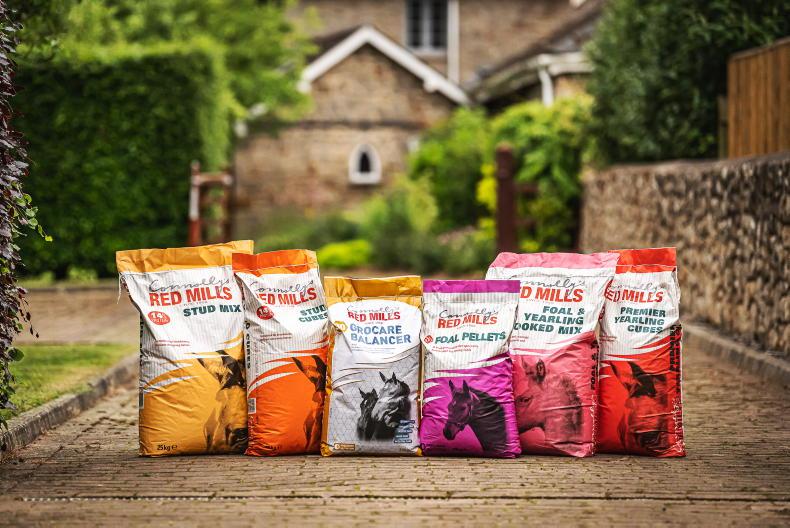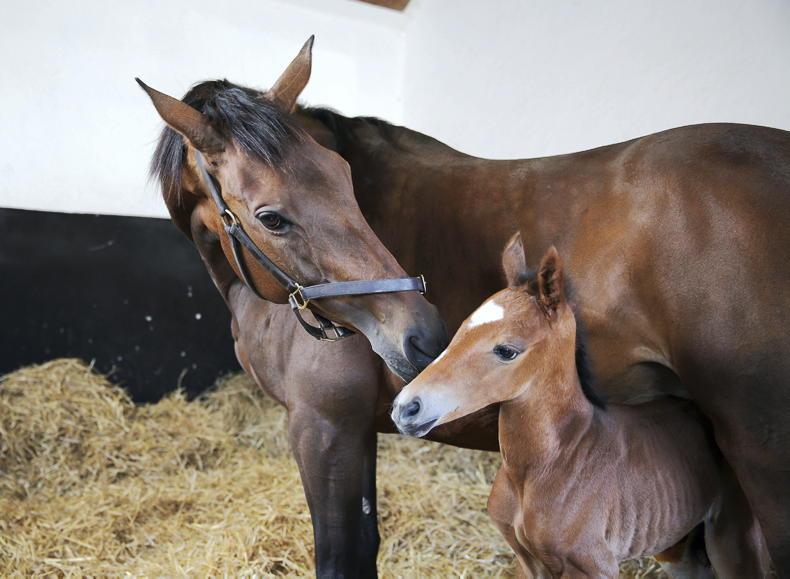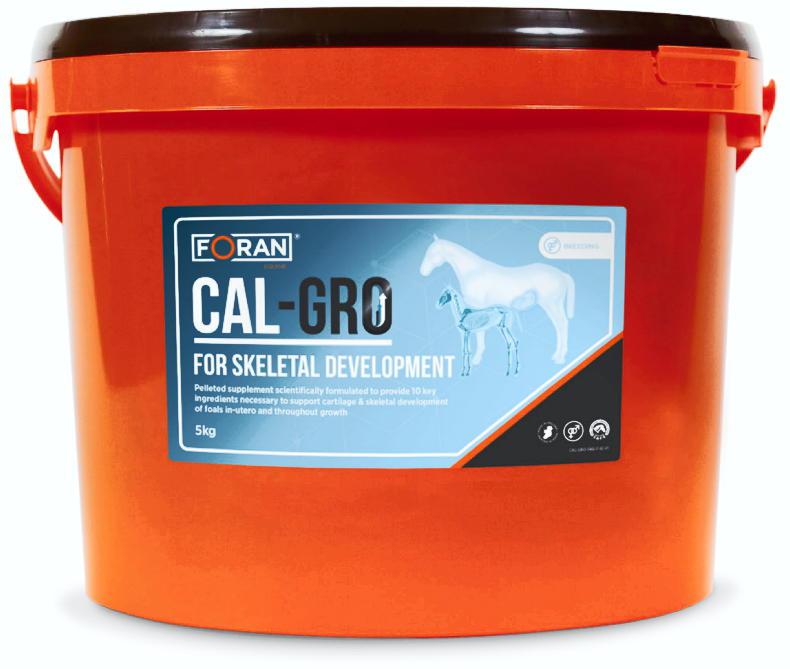Support pregnant mares with slower appetites
Did you know that, as the foal grows, the pregnant mare’s uterus expands significantly, putting physical pressure on the stomach and often leading to a decrease in appetite. If your mare has significantly cut back on the amount she is consuming per day, consider feeding Connolly’s Red Mills Grocare Balancer in lieu of a portion of her normal stud ration.
Grocare Balancer is a concentrated source of essential amino acids, vitamins, and minerals to ensure your mare, and her foal are meeting their nutritional requirements in late pregnancy, supporting foal development and colostrum quality.
Supplement for skeletal strength and development
In the final trimester of pregnancy, the foal’s skeleton undergoes rapid growth and mineralisation, which requires specific nutrients from the mare’s diet. Targeted nutrition in late pregnancy is essential for preventing skeletal issues like developmental orthopaedic diseases (DOD) and ensures that the foal reaches its optimal growth potential. Foran Equine Cal-Gro can be supplemented directly to the mare in late pregnancy to support the intake of key vitamins and minerals including vitamin A, vitamin D, calcium, phosphorus, zinc, manganese and copper.
Optimise colostrum quality
All foals are born with an underdeveloped immune system and require sufficient amounts of high-quality colostrum to transfer antibodies from the mare to the foal within the first 24 hours of birth. The quality of colostrum is measured by the amount of infection-fighting immunoglobulins (IgGs) or antibodies present. If you have had concerns with colostrum quality in the past, consider feeding your mare from the Connolly’s Red Mills Care Range feeds, which include prebiotics, probiotics and elevated levels of antioxidants, which have been shown to increase IgG concentrations in colostrum, thus improving the immune status of the foal. Omega-3 fatty acids can also be supplemented in the form of Foran Equines Karron Oil or Linseed Oil to improve IgG concentrations in mares foaling early in the year, without access to fresh grass.
Condition mares that ‘milk off their backs’
Every stud farm has a mare that is almost too generous to her foal and leaves very little for herself. Early lactation is an extremely demanding time for mares. It can be challenging to meet the calorie and protein requirements, particularly for mares foaling early in the year with limited fresh grazing. Mares that struggle to hold condition in early lactation may cycle irregularly and can be difficult to get back in-foal. Consider supplementing your mare’s diet with Connolly’s Red Mills Define & Shine, a calorie-rich pellet that is formulated with an amino acid profile that mirrors mares’ milk. Define & Shine is also high in omega-3 fatty acids, which are often deficient in winter diets. Feed Define & Shine daily on top of a balanced diet to support your mare this season.
Get your foal off to a good start
A healthy foal is the foundation for his future. Recent published research by the University of Surrey showed that the composition of gut bacteria of thoroughbred racehorses at 28 days old can predict their future health and athletic performance. Foals with a more diverse gut microbiome and those not exposed to antibiotics during their first month have been shown to perform better on the racetrack and have a lower risk of respiratory disease.
While antibiotics remain essential for managing certain health issues, and further research is needed to fully understand the foal microbiome, there are ways to proactively support immune health through nutrition. Foran Equine’s Friska Foal is a daily multivitamin and prebiotic syrup specifically designed to aid the growth of healthy gut bacteria and promote a strong, resilient immune system in foals. This palatable syrup is suitable for daily supplementation in all foals, or during times of stress and ill-thrift.
PREPARATION is key to success when it comes to the foaling season, whether you have one mare to foal or 50, there are some basic elements that should be included in your foaling kit. Having a foaling kit prepared in advance will avoid panic and provide piece of mind.
Your kit should include standard items needed for the foaling process, and those that may be needed in case of emergency. Like anything with horses, expect the unexpected. Whether you chose to allow your mare to foal out, or in a confined space such as a suitably bedded foaling box, good management and monitoring is vital.
An important consideration for your pregnant mare is to ensure that both vaccines and the de-worming programme are up to date. If your mare has had a Caslick’s procedure the suture line should be opened by your vet prior to your mare’s due date.
Normal gestation for a mare is between 320 and 365 days, with the average being 341. It is imperative that, on approach of the due date, regular observation of the mare is carried out, to monitor for any physical changes that may indicate an imminent foaling.
Labour consists of three stages, it is important to familiarise yourself with these stages, and the accompanying problems which may arise.
Essential foaling kit checklist from the Foran Equine team:
Contact and communication:
Key Times to Note:
Cleaning and examination:
Foaling Assistance:
Post-Foaling Care:
Tools and recording:


 This is a subscriber-only article
This is a subscriber-only article
 It looks like you're browsing in private mode
It looks like you're browsing in private mode












SHARING OPTIONS: